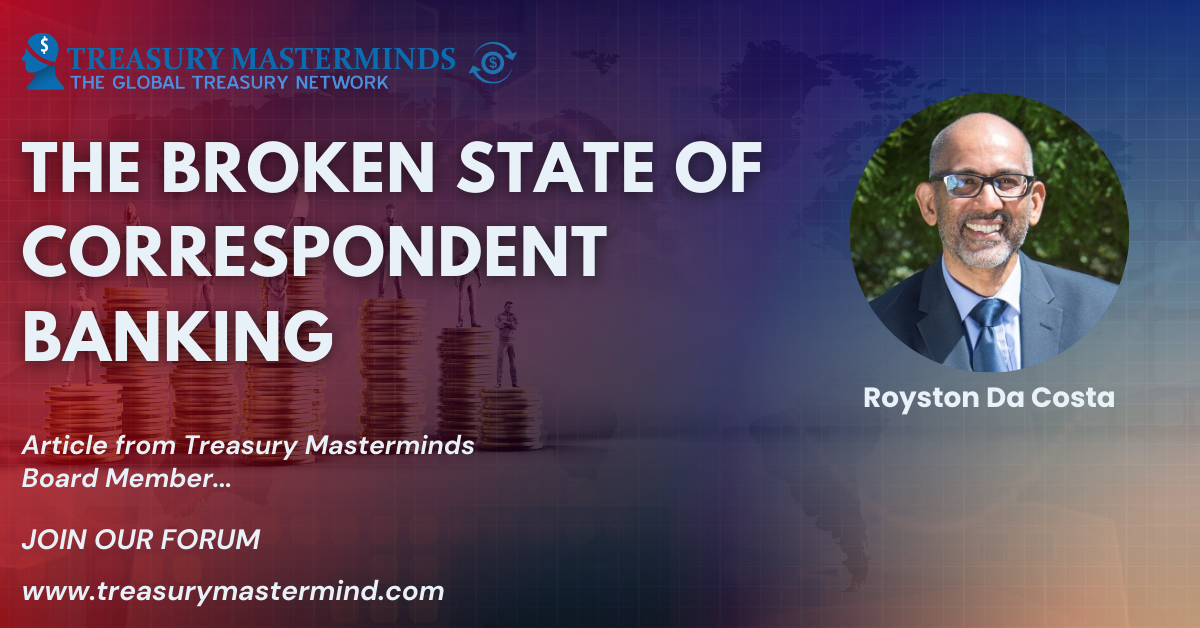

Written By:
Royston Da Costa
Mastermind Board Member
“The opinions expressed in this article are solely those of the author and not necessarily those of Ferguson.”
Introduction
Correspondent banking has long been the backbone of cross-border trade and global financial integration. However, having recently experienced what was an inefficient and complex system, I began to scrutinise the system for its vulnerabilities. In this article, I will explore the contributing factors to this, as well as the implications for global finance, and potential solutions for a more resilient and efficient system.
Understanding Correspondent Banking
Correspondent banking involves relationships between banks, where one bank (the correspondent) provides services on behalf of another bank (the respondent), usually in a different country. This system allows banks to access financial services in jurisdictions where they do not have a physical presence, enabling international payments, trade finance, and foreign exchange transactions. Usually, correspondent banks have a relationship with the respondent bank; however, there are occasions when a correspondent bank may be required to deal with a bank it does not have a primary correspondent relationship with, and this can be very frustrating for the Corporate caught in the middle.
The correspondent banking model, which has remained largely unchanged for decades, is increasingly seen as outdated and inadequate for the demands of the modern global economy. This is further emphasised by the 14 days that it took a correspondent bank to return funds that do not belong to them to one Corporate I know.

Key Issues Plaguing Correspondent Banking
Operational Inefficiencies
Correspondent banking is inherently complex, involving multiple intermediaries, time zones, and jurisdictions. This complexity often results in slow transaction processing times, high costs, and a lack of transparency. Payments can take several days to clear (sometimes weeks), with little visibility for customers on the status of their transactions. This inefficiency is particularly problematic in a world where consumers and businesses expect real-time financial services.
Moreover, the reliance on legacy systems and outdated technology exacerbates these operational inefficiencies. Many banks, some even consider themselves as global players, still use systems that are decades old, making them ill-equipped to handle the demands of modern finance, such as instant payments, enhanced security, and data analytics.
Regulatory and Compliance Burden
I recognise that one of the most significant challenges facing correspondent banking today is the escalating regulatory and compliance burden. In the aftermath of the 2008 financial crisis and subsequent money laundering scandals, regulatory bodies around the world have tightened their grip on financial institutions. Anti-money laundering (AML) and counter-terrorism financing (CTF) regulations have become more stringent, with banks now required to conduct extensive due diligence on their counterparties, which is fair, in my opinion.
While these regulations are necessary to safeguard the financial system, they have also made correspondent banking more cumbersome and costly.
Cybersecurity Threats
The rise of cybercrime poses another significant challenge to the correspondent banking system. The global nature of these networks makes them attractive targets for cybercriminals, who can exploit vulnerabilities in the system to commit fraud, theft, or other malicious activities. The risk of cyberattacks has grown as financial institutions have become more interconnected, and the potential for significant financial and reputational damage has increased.
As the threat of cybercrime continues to increase, it is incumbent on banks within the correspondent network to invest in appropriate cyber security and ensure they are not reliant on outdated security protocols. Otherwise, this could not only expose them to potential breaches but also undermine the trust that is essential for the smooth functioning of correspondent banking relationships.
Consequences of a Broken System
Financial Inclusion
The broken state of correspondent banking has wide-ranging implications for the global financial system. The most immediate impact is on financial inclusion. As correspondent relationships dwindle, so too do the opportunities for individuals and businesses in affected regions to participate in the global economy. This can exacerbate poverty, hinder economic development, and perpetuate inequality.
Inefficiencies and Costs
Additionally, the inefficiencies and costs associated with correspondent banking can stifle innovation. Fintech companies and other financial innovators often find it challenging to navigate the complex and costly correspondent banking landscape, limiting their ability to offer new and improved financial services to consumers. A good example of this is the solution for KYC (Know Your Customer), and whereas a number of Fintechs offer excellent solutions for this regulatory requirement, invariably the banks do not have the technology to plug in to the Fintech’s solution.
Moreover, the fragility of the correspondent banking system poses a risk to global financial stability. As fewer institutions are willing or able to maintain these relationships, the system becomes more concentrated, increasing the risk that a failure in one part of the network could have cascading effects throughout the global financial system.
Potential Solutions and the Way Forward
Addressing the problems in correspondent banking requires a multifaceted approach that involves both technological innovation and regulatory reform.
Adoption of New Technologies
In my view, the adoption of blockchain and distributed ledger technologies (DLT) offers a promising solution to many of the issues plaguing correspondent banking. These technologies can enable faster, more secure, and more transparent transactions, reducing the reliance on multiple intermediaries and legacy systems. Blockchain’s potential to provide real-time settlement and immutable transaction records could significantly enhance the efficiency and security of cross-border payments.
Rise of Central Bank Digital Currencies
Moreover, the rise of central bank digital currencies (CBDCs) could also revolutionise the correspondent banking model. CBDCs, by offering a digital alternative to traditional currencies, could streamline cross-border payments and reduce the need for correspondent relationships.
I recognise that this is unlikely to take place anytime soon, however, it certainly offers a worthy goal to aim for, especially if it eliminates the current experience of a bank being able to ‘sit on funds’ indefinitely with seemingly no accountability to anyone!
Regulatory Harmonization and Cooperation
To reduce the regulatory burden on correspondent banking, there is a need for greater harmonisation and cooperation among international regulatory bodies, another seemingly impossible challenge! By aligning AML and CTF regulations and streamlining compliance requirements, regulators can reduce the costs and complexities associated with maintaining correspondent relationships.
Enhancing Cybersecurity
Improving cybersecurity is essential for restoring trust in the correspondent banking system. All banks must invest in modern security technologies and protocols to protect against the growing threat of cybercrime. Collaboration between financial institutions, regulators, and cybersecurity experts is also crucial to developing industry-wide standards and best practices that can mitigate the risk of cyberattacks.
Conclusion
Correspondent banking, once the cornerstone of global finance, is now in urgent need of reform. The challenges of regulatory compliance, operational inefficiencies, shrinking networks, and cybersecurity threats have exposed the system’s vulnerabilities, with significant implications for financial inclusion, innovation, and global stability.
However, by embracing new technologies, promoting regulatory cooperation, and enhancing cybersecurity, the financial industry can address the flaws in correspondent banking and build a more resilient and efficient system for the future. Only through such concerted efforts can we ensure that correspondent banking continues to play a vital role in the global economy, enabling cross-border trade and financial inclusion for all.
Recommended Reading
- Ripple USD (RLUSD): A New Player in the Stablecoin Market
- Bunq Unveils its own AI Money Assistant
- Reuters FED Interest Expectations
- SWIFT AI in Fraud Check
- AI Tools and Platforms for Financial Analysis
- Visa Expands Digital Wallet Capabilities with Seven Key Payment Innovations
- CNBC article discusses the growing concerns about the United States
- Are You Developing Skills That Won’t Be Automated?
Join our Treasury Community
Treasury Masterminds is a community of professionals working in treasury management or those interested in learning more about various topics related to treasury management, including cash management, foreign exchange management, and payments. To register and connect with Treasury professionals, click [HERE] or fill out the form below.